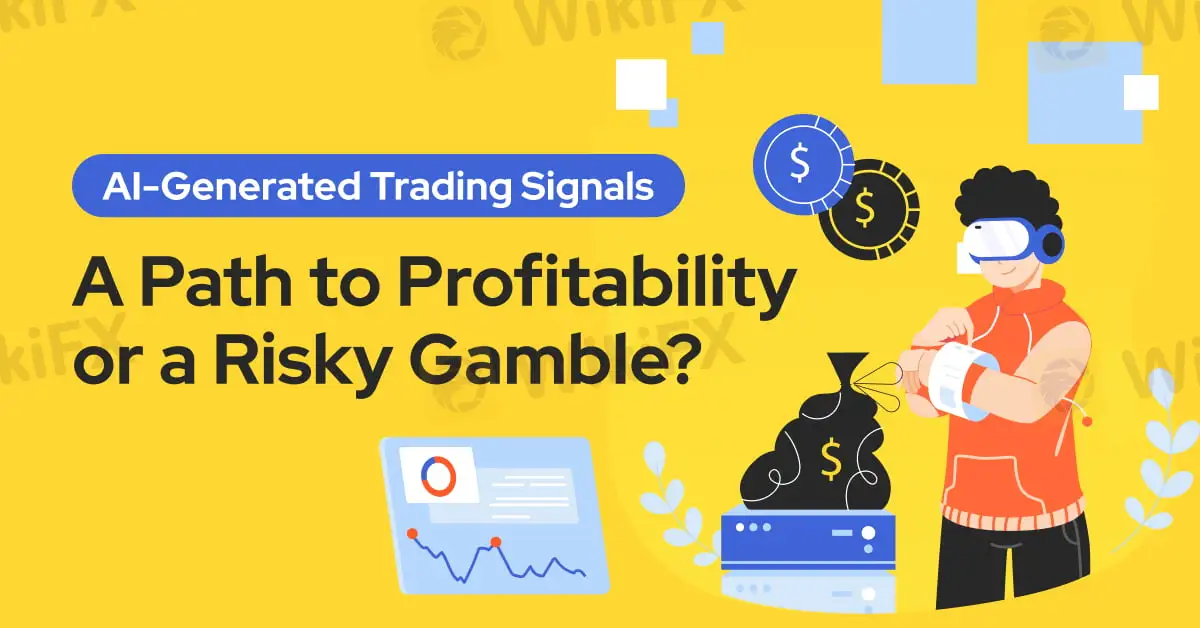简体中文
繁體中文
English
Pусский
日本語
ภาษาไทย
Tiếng Việt
Bahasa Indonesia
Español
हिन्दी
Filippiiniläinen
Français
Deutsch
Português
Türkçe
한국어
العربية
AI-Generated Trading Signals: A Path to Profitability or a Risky Gamble?
Sommario:The adoption of AI in analysing markets and generating trading signals is growing rapidly. The question that lingers, however, is whether relying on AI-generated trading signals can truly make traders profitable

In recent years, artificial intelligence (AI) has taken the financial world by storm, with many claiming that it holds the key to revolutionizing trading strategies. From hedge funds to individual retail traders, the adoption of AI in analysing markets and generating trading signals is growing rapidly. The question that lingers, however, is whether relying on AI-generated trading signals can truly make traders profitable. Is it a golden ticket to consistent returns, or a technological gamble with uncertain outcomes?
Artificial intelligence has made impressive strides in recent years, with its capacity to process vast amounts of data and detect patterns that would be impossible for a human to identify. AI-based trading signals are built on complex algorithms that analyse historical market data, price movements, news sentiment, and even social media trends. By doing so, these systems can generate buy or sell signals, allowing traders to make decisions based on the data-driven insights produced by AI.
In theory, AIs ability to process data without emotional bias should give traders an edge. After all, markets are often driven by irrational behaviours, fear, and greed. AI could, in principle, cut through the noise, providing cold, calculated recommendations that outperform emotionally driven decisions.

- Speed and Efficiency: AI can process immense volumes of data in real-time, providing traders with near-instantaneous signals. This speed is particularly important in fast-moving markets, where seconds can make a difference between profit and loss.
- Eliminating Emotion: Traders often make mistakes due to psychological factors like fear, greed, and overconfidence. AI systems operate purely on logic and data, which helps to eliminate the emotional biases that human traders might face.
- Identifying Complex Patterns: AI algorithms can uncover market patterns and trends that might not be obvious to even the most seasoned traders. Machine learning models are continuously improving, meaning that over time, AI can adapt to changing market conditions and fine-tune its signal accuracy.
- Back testing and Optimization: AI systems can back test their models on historical data, allowing traders to see how a strategy would have performed in the past. This gives traders a clearer idea of potential risks and rewards before they put real capital at stake.
With all these benefits, its tempting to view AI-generated signals as a surefire way to achieve success in trading. However, as with any technology, there are potential pitfalls and uncertainties that traders must consider.

- Overfitting to Past Data: AI systems often rely on historical data to generate predictions. One major issue is overfitting—when an algorithm is trained too closely on past data, it may perform well in simulations but fail when faced with new, unseen market conditions. Just because a system worked in the past does not guarantee future success, especially in a volatile market.
- Market Unpredictability: Financial markets are driven by a complex mix of factors, including political events, economic data, and unforeseen global crises. AI, no matter how sophisticated, cannot predict black swan events or sudden market crashes. AI models may also struggle in chaotic, low-liquidity environments, where price movements are driven more by irrational human behaviour than by predictable patterns.
- Blind Trust: Another risk is that traders may become overly reliant on AI-generated signals without fully understanding the rationale behind them. Trusting AI blindly can lead to poor decision-making, especially when the system is prone to errors or misinterpretation of data. Traders must remember that AI is a tool, not a crystal ball, and should always cross-verify with their own analysis.
- Regulatory and Ethical Considerations: AI-driven trading is still a relatively new frontier, and there are growing concerns about its regulatory oversight. Some worry about the ethical implications of algorithmic trading, especially when market manipulation or flash crashes are linked to automated systems. Traders who rely on AI must also be aware of evolving regulations that may affect the future use of such technology.
Given these challenges, a balanced approach may be the key. AI should not be seen as a replacement for human judgment but rather as a supplementary tool. Traders who combine AI-generated signals with their own expertise and market knowledge are likely to be better positioned to manage risks and navigate the complexities of trading.
AI can offer valuable insights and help traders filter through the vast amount of market data, but ultimately, it is the trader who makes the final decision. Experienced traders may find that AI helps them avoid common pitfalls, while less experienced traders may use AI as an educational tool to improve their understanding of the market.
In summary, the question of whether AI-generated trading signals are trustworthy and capable of making traders profitable remains open to debate. While AI offers clear advantages in speed, data processing, and emotion-free decision-making, it also presents risks related to market unpredictability and algorithmic errors. For traders looking to use AI, the best approach may be to strike a balance—leveraging AI's strengths while remaining vigilant and relying on their own analysis to make informed decisions. Ultimately, AI in trading should be viewed as a powerful tool, but not the sole determinant of success. The road to profitability still depends on a combination of technology, skill, and human intuition.

Disclaimer:
Le opinioni di questo articolo rappresentano solo le opinioni personali dell’autore e non costituiscono consulenza in materia di investimenti per questa piattaforma. La piattaforma non garantisce l’accuratezza, la completezza e la tempestività delle informazioni relative all’articolo, né è responsabile delle perdite causate dall’uso o dall’affidamento delle informazioni relative all’articolo.
WikiFX Trader
GO MARKETS
STARTRADER
FOREX.com
Octa
FXTM
XM
GO MARKETS
STARTRADER
FOREX.com
Octa
FXTM
XM
WikiFX Trader
GO MARKETS
STARTRADER
FOREX.com
Octa
FXTM
XM
GO MARKETS
STARTRADER
FOREX.com
Octa
FXTM
XM
Rate Calc


